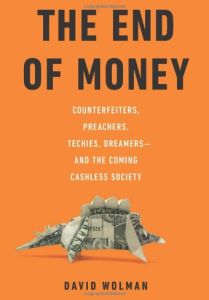
Book
The End of Money
Counterfeiters, Preachers, Techies, Dreamers – and the Coming Cashless Society
Da Capo Press,
2012
mais...
Copyright © 2012 by David Wolman
Published by Da Capo Press, a subsidiary of Perseus Books LLC
ISBN: 9780306818837
Pages: 240
Published by Da Capo Press, a subsidiary of Perseus Books LLC
ISBN: 9780306818837
Pages: 240
Recommendation
Thanks to credit cards, PayPal, online bill paying and other developments, cash is becoming increasingly passé. Wired editor David Wolman examines all aspects of money to explain why physical currency may be a concept whose time has passed. Though the end of cash may not seem likely at present, getAbstract recommends his take on electronic currency to all those who seek a better understanding of the future direction of money.
Summary
About the Author
David Wolman is a contributing editor for Wired. A former Fulbright journalism scholar in Japan, he has written for The New York Times, The Wall Street Journal, Time and Nature.







Comment on this summary